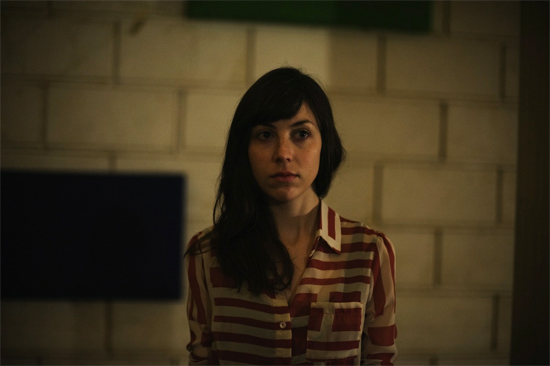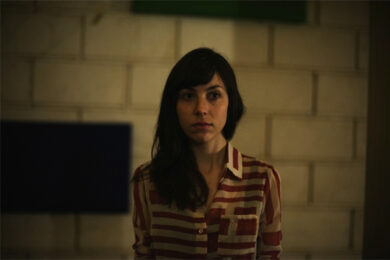As is so often the case when summer advances and the air itself begins to sweat with thundery humidity, Cafe Oto’s walls and windows are slick and misted with perspiration. Thanks to the occasional bouts of drizzle and heavy weather outside, the packed venue has heated up to a near unbearable temperature, and members of the crowd frequently dart outside for a gulp of fresh air and a cheeky cigarette. Though playing it as cool and quietly witty as possible under the circumstances, even Julia Holter, the centre of this evening’s attention, isn’t immune to the clingy atmosphere, frequently pausing between songs to catch her breath. Holter, her sound bolstered by a pair of backing musicians, is here for her first UK shows since the release this March of the widely acclaimed Ekstasis album, and considering the low-key intimacy of the venue there’s a fair amount of anticipation in the air.
The hype surrounding Holter’s music – some justified, some less so – is hinged largely around the fact that her records are the work of a skilled and very eclectic composer. Somewhere between pop songwriter, folk chanteuse and conservatory-schooled theory nerd, her songs, particularly on Ekstasis, find her treading the junctures between disciplines with admirable skill. It’s a divisive record, though, one that’s frequently more impressive than it is lovable. Much of its appeal comes from its carefully balanced and delicately layered compositional approach – it’s possessed of an unusual vertical depth – rather than the songs themselves, which often feel either slightly affected or bogged down in the weight of their surroundings. Its arrangements frequently feel too packed too allow the songs themselves to shine through. Last year’s Tragedy is the superior record, hewn to a loose concept based around Hippolytus’ play Euripedes and possessed of an eerie, self-contained intensity, where Ekstasis is simply free to drift lightly and tickle the eardrums. So today’s show presents an interesting question, even before Holter has taken to the stage behind a simple keyboard and mic set up: how will these intricate studio creations play out in the pressure of a live situation?
The answer, it turns out, is a mixed one. On the one hand, stripping the Ekstasis material down to the bare bones often allows the songwriting itself greater room to breathe. Where on record, opener ‘Marienbad’ can feel clogged by the choir of multitracked Holters that interweave across its length, here its pillowy arpeggios are accompanied simply by one vocal line, propped up by soft backing from Chris Votek’s cello and drums from Corey Fogel. ‘Moni Mon Amie’, one of the album’s highlights, matches its recorded counterpart for quiet majesty – as one of the album’s most pared back moments, it’s perhaps easier to translate directly into the live arena. Holter’s voice live is even more arresting than on record, where it’s frequently buried behind electronic processing and a host of surrounding instruments – her range and clarity is startling, and you suspect that were her microphone switched off it would still be possible to hear her clearly above the surrounding music.
But the minimalist approach proves a double edged sword: a side effect of scrubbing her songs free of extra adornment is to lay bare the relatively direct impulses that drive them. Much has been made of Holter’s place at the forefront of a new generation of songwriters, drawing equally from a variety of traditions to create something arresting and new. But on record the sophistication of their arrangements belies the frequent simplicity of their content. That’s not necessarily a bad thing – most are lovely songs in their own right. However, losing the extra adornment frequently grounds her music, and especially the Ekstasis material, where on record it’s capable of soaring into its own self-generated space. Instead, she recalls an entirely more recognisable series of reference points, from the witty pop of Kate Bush to the fantasy Americana of Joanna Newsom, via bedroom synth philosopher John Maus and even Irish queen of MOR synth epics Enya. The connection to the latter feels especially strong tonight: on a new song, which moves from sharp stacatto verses to a towering refrain of chorused synth harmonies, Holter’s darting, loopy vocal tics and lustrous but peculiarly thin melodies are reminiscent of the lilting circular lines of ‘The Celts’ or ‘Caribbean Blue’. (A couple of friends pick up on the same connection; to be fair to Holter, though, she’s far from the only current underground concern whose music brings Enya to mind).
On the whole these issues don’t taint Holter’s music – nothing wrong with a bit of Enya, after all. Like on record, Tragedy‘s marvelous ‘Try To Make Yourself A Work Of Art’ stands out this evening, gradually ascending on snarling blows from Votek’s cello to a doomy, for-whom-the-bell-tolls sort of epic. However, where her live show might have been expected to make more sense of her slipperiness on record, this evening’s performance instead serves to raise more questions. Not necessarily a bad thing, more a confounding spanner slung in the works and left to corrode for at least a while longer; I’m left pondering what next to expect from this hardest to place of songwriters.



